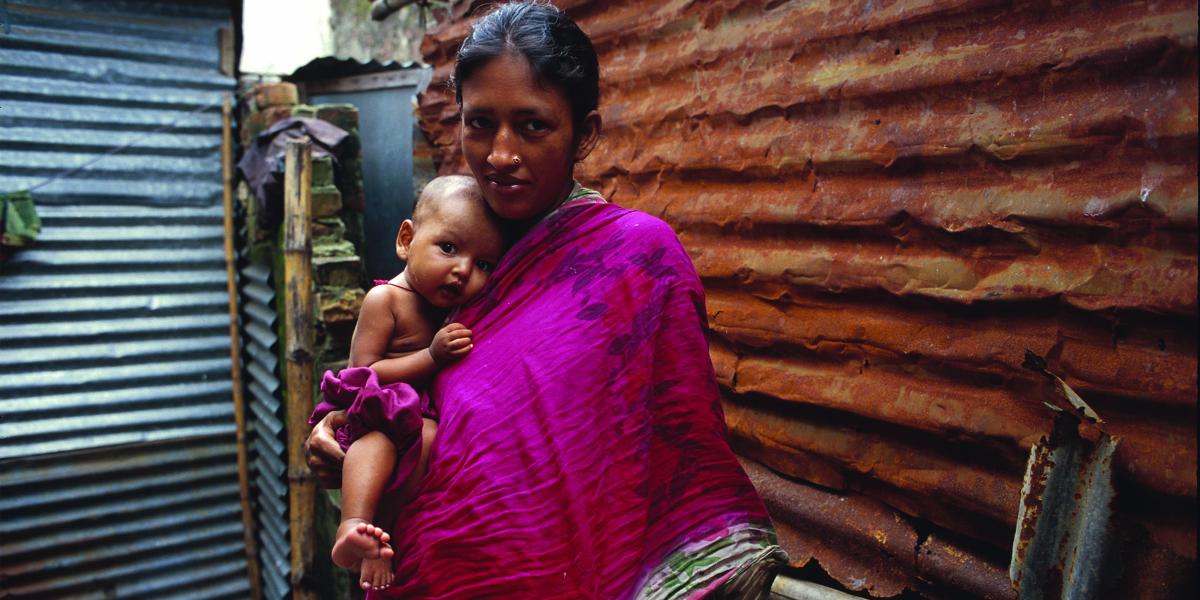Improving the Odds
Research offers hope for newborns in the developing world.
Each year, 4 million babies born in developing countries—about one in 15—die as newborns.
Improving odds of survival for newborns has long been a priority for Bloomberg School researchers. Now, after testing a variety of inexpensive interventions in South Asia, researchers have demonstrated new ways to keep infants alive during the risky first few weeks of life, when their immune systems are underdeveloped and they can fall prey to a host of infections. And in Africa, researchers have found new hope for the infants of HIV-positive mothers.
Overall, the interventions have the advantage of costing little while reaching deep into mountainous and other rural areas where community health workers are often spread thin.
"Our philosophy has been to find solutions that are achievable and cheap enough for developing countries to use them, so communities can implement them and see strong effects on certain outcomes, like death," says James Tielsch, PhD '82, MHS '79, International Health professor.
In a study involving nearly 16,000 newborns in rural northwestern Bangladesh, Rolf Klemm, an assistant scientist at the School's Center for Human Nutrition, and Keith West, Jr., a professor in International Health, found that giving infants a single, 50,000-I.U. dose of vitamin A orally shortly after their birth can reduce their risk of death by 15 percent. Each dose costs just two cents.
Infants in developing countries are typically born with very low stores of vitamin A, which may make them more susceptible to diarrhea, respiratory infections and the generalized infection known as sepsis. In some countries with particularly high rates of at-risk infants, sepsis causes between 40 and 50 percent of deaths. While mothers deliver vitamin A via breast milk, their levels of it may be too low to help their babies fight disease.
The study by Klemm, DrPH '02, MPH '85, and West, DrPH '87, MPH '79, draws on numerous studies linking vitamin A deficiency to high child mortality rates. The research was pioneered almost three decades ago in Indonesia by Alfred Sommer, MD, MHS '73, dean emeritus of the Bloomberg School. In Indonesia and other developing countries, Sommer and others showed that giving young children vitamin A every six months dramatically reduced their risk of death.
"The Bangladesh newborn vitamin A trial is the largest of all that have been done to date," says West. "Its findings have become, for many in policy and program circles, the tipping point in providing convincing evidence that newborn vitamin A dosing can reduce infant mortality across southern Asia." Klemm, West and other researchers on their team are currently researching the effect of multivitamin and mineral supplement use by pregnant mothers in Bangladesh on the health of their newborn babies.
Infants in their first month of life can also benefit when parents and other family members have received training on essential newborn care. A second study conducted in Bangladesh and published in the June issue of The Lancet found that when community health workers in poor regions teach basic infant care and diagnostic skills to people in the home, they reduce an infant's chance of dying by 34 percent. The health workers taught families about the importance of drying and wrapping the baby soon after delivery, delaying a newborn's first bath for 72 hours, recognizing and treating breathing problems, exclusively breastfeeding a baby for the first six months and so on. Abdullah Baqui, MBBS, DrPH '90, MPH '85, an International Health associate professor; Robert E. Black, MD, MPH, chair of International Health; and others authored The Lancet article.
In nearby Nepal, where 30,000 newborns die each year, researchers found that only 15 percent of Nepali women wash their hands before handling a newborn, according to a study published in the Archives of Pediatric and Adolescent Medicine in July. Birth attendants who washed their hands reduced the risk of neonatal mortality by 19 percent; mothers who did so before handling their babies, 44 percent, the study reports.
"Science has known since the 1860s that hand washing is a good thing for preventing the spread of infection," says Tielsch, the study's senior author. "We did the study to educate people about that and to remind ourselves that simple things can make a big difference in the health of a child."
But there are still challenges in getting the word out. Three in four Nepali women can't read, making education mostly a word-of-mouth activity. Fortunately, in Bangladesh and Nepal, "we're lucky in that there are people on the ground from the government and other organizations who know how to do this stuff," says Tielsch.
He and others at the Bloomberg School hope that the interventions can be modeled and used in other countries, including in Africa, home to the majority of the top countries for child mortality worldwide.
In the African nation of Malawi, Taha E. Taha, MBBS, PhD '92, MPH, an Epidemiology professor, found that treating breastfeeding infants with an anti-HIV regimen greatly reduces their risk of contracting HIV from their mothers.
The Malawi study, published in July in The New England Journal of Medicine, involved 3,016 infants who did not have HIV at birth but who were at risk for getting the disease from the breast milk of their infected mothers. The risk was halved when infants were given the HIV drug nevirapine. A single dose was administered during the babies' first week, as soon as a baby can swallow fluids, followed up by a once-a-day regimen up to age 14 weeks. The infants were tested for HIV at nine months. Nevirapine used in conjunction with a second drug reduced the risk to the same extent.
Taha believes that the drug, which is available free from several health and relief agencies, could help slow the march of HIV across Malawi, where one in every 14 adults is infected. "It is practical and cost-effective," he says.
